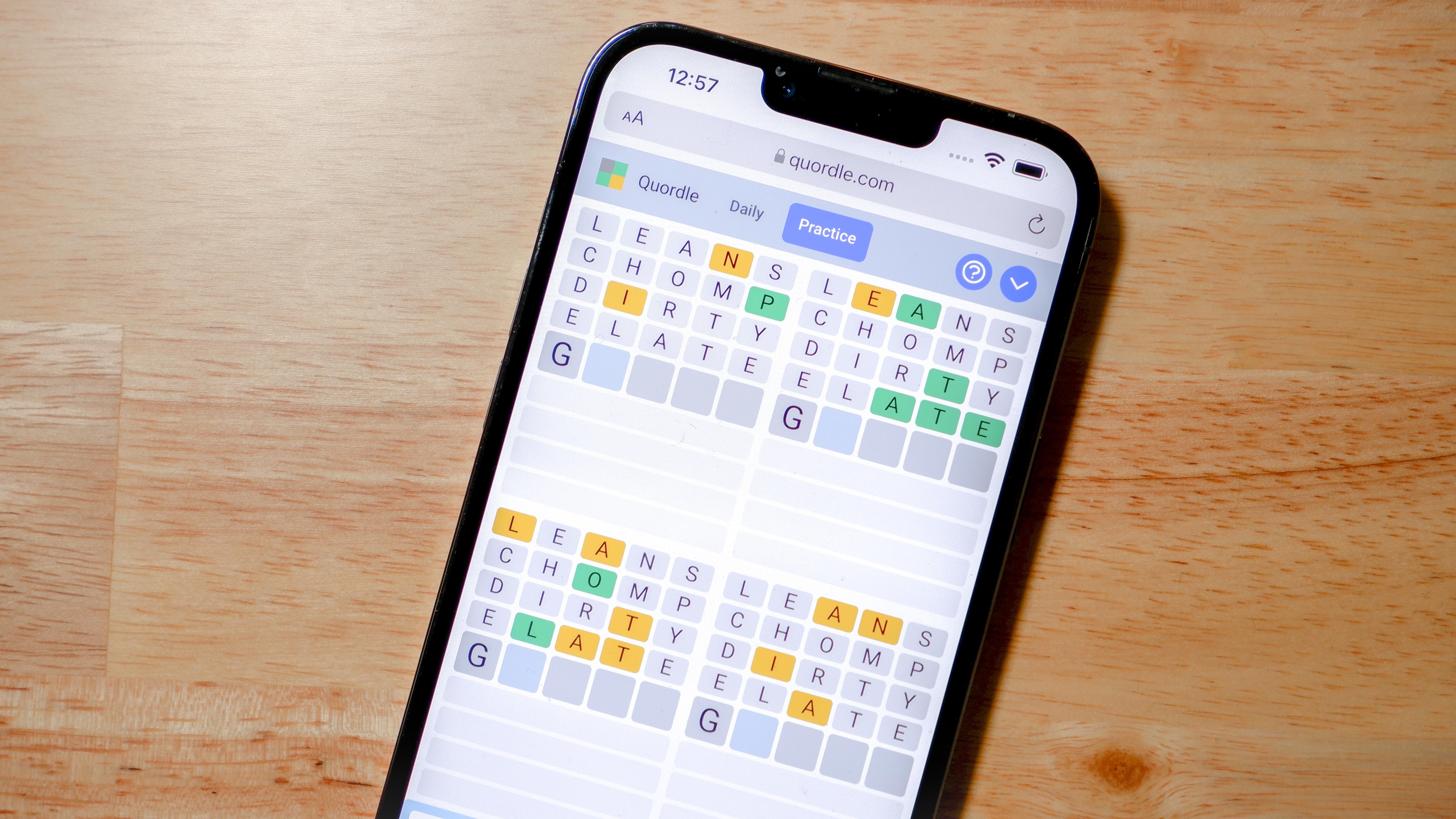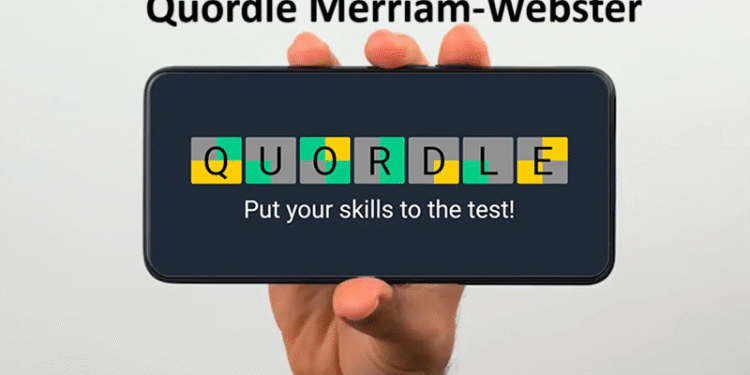Quordle Merriam-Webster If you’re a fan of word puzzles and daily brain teasers, you’ve probably heard of Wordle—the simple five-letter guessing game that took the internet by storm. But if you’ve already mastered Wordle and are looking for something more challenging, let’s talk about Quordle Merriam-Webster—a game that takes the concept and multiplies it by four. And when you add the Merriam-Webster name to it, you know things are about to get interesting.
Let’s break down what Quordle Merriam-Webster really means, why this partnership matters, and how it’s changing the word-game scene for puzzle lovers everywhere.
What Exactly Is Quordle?
Before diving into the Merriam-Webster connection, let’s get familiar with Quordle Merriam-Webster itself. If Wordle is a friendly jog around the block, Quordle is a full-blown marathon for your brain. The game challenges you to guess four five-letter words at once, using only nine attempts in total. That’s right—each guess you make counts for all four words simultaneously.
At first glance, it looks intimidating. You see four grids, each reacting differently to the same guess: one might show a green letter (right letter, right place), another might flash yellow (right letter, wrong spot), and the others might remain gray (wrong letter entirely). It’s a wild ride of logic, pattern recognition, and vocabulary.
What makes Quordle Merriam-Webster so addictive is how it forces your brain to multitask. You’re essentially juggling four puzzles at the same time. It’s not just about knowing words—it’s about strategizing. You must think ahead, balancing your guesses so that each word benefits from the limited attempts.
And here’s the kicker: Quordle Merriam-Webster gives you that same daily thrill as Wordle—a new puzzle drops every day. Some people finish in six guesses, others barely make it in nine, and many lose entirely. But the fun lies in the challenge. Once you solve all four, you feel like you just conquered a linguistic mountain.
The Merriam-Webster Connection: A Game-Changing Partnership

So, where does Merriam-Webster come into the picture? In early 2023, Merriam-Webster officially acquired Quordle Merriam-Webster , cementing its place as more than just a fun internet fad. The move surprised some, but in hindsight, it made perfect sense.
Merriam-Webster, the iconic American dictionary publisher, has long been synonymous with language, words, and education. For decades, their dictionaries have helped generations of students, writers, and readers expand their vocabulary. By acquiring Quordle Merriam-Webster, they didn’t just buy a word game—they embraced a modern, interactive way to engage people with words again.
This partnership gave Quordle Merriam-Webster an extra layer of credibility. It wasn’t just a viral copycat of Wordle anymore; it became an official part of one of the world’s most respected language brands. That’s a huge step up. And for Merriam-Webster, it was a clever move into the digital era—a way to reach younger audiences who might never crack open a physical dictionary but love learning through play.
Since the acquisition, the game hasn’t lost its charm. Merriam-Webster kept Quordle Merriam-Webster familiar gameplay intact, while adding subtle refinements, better integration with their platform, and a focus on improving the overall experience. The company even hinted at introducing new features in the future—think vocabulary challenges, learning tie-ins, and maybe even themed puzzles.
Why Quordle Merriam-Webster Works So Well Together
The combination of Quordle Merriam-Webster game design and Merriam-Webster’s linguistic authority is a match made in word-game heaven. It’s rare to see a brand partnership that feels so natural. But why does it work so well? Let’s break it down.
1. It Blends Fun and Learning Perfectly
Most educational games tend to lean too hard on the “learning” side, making them feel more like homework than entertainment. Quordle Merriam-Webster , however, keeps things fun first. You’re not forced to memorize definitions or fill in blanks—you’re solving puzzles. Yet, by playing regularly, you’re passively expanding your vocabulary.
You come across new words all the time. Maybe you’ve never used “DINGY” or “TACIT” in a sentence before, but after solving them in Quordle Merriam-Webster , they’re burned into your memory. That’s where Merriam-Webster’s influence shines: each word in the game is rooted in real dictionary-approved vocabulary, not random jargon.
2. It Feels Reliable and Smart
Before Merriam-Webster’s acquisition, Quordle Merriam-Webster was just another web-based puzzle with uncertain longevity. Now, it feels established. You can trust that the word lists are accurate, that the gameplay will remain stable, and that you’re engaging with something meaningful—not just a passing internet trend.
Merriam-Webster adds a layer of authenticity and longevity to Quordle Merriam-Webster. Players can rely on the fact that every word comes from a trusted lexicon source, which not only enriches the experience but also makes it feel legitimate and refined.
3. It Appeals to All Word Lovers
Word games attract a wide range of people: language enthusiasts, casual gamers, educators, and even competitive types who love a challenge. The Quordle Merriam-Webster combo bridges all these audiences beautifully. It’s accessible enough for beginners but challenging enough for hardcore puzzle solvers.
And because Merriam-Webster has always been about expanding people’s understanding of words, the brand alignment feels organic. It’s not a gimmick—it’s an evolution.
How to Play Quordle Like a Pro
If you’ve never played before, Quordle Merriam-Webster can feel overwhelming at first glance. But don’t worry—it’s easier once you understand the strategy behind it. Here are a few expert tips to help you tackle your daily puzzle like a pro.
Start with a Strong Opening Word
The first word you choose sets the tone for the entire game. Opt for something that covers common letters and vowels—like “STARE,” “CRANE,” or “AUDIO.” These give you the maximum possible feedback on your first try.
Because you’re solving four words simultaneously, one smart first guess can reveal useful information across all grids. It’s the most efficient way to start narrowing down possibilities early on.
Think Broadly, Then Narrow Down
In Wordle, you can focus on one word at a time. In Quordle Merriam-Webster, that’s not an option. Every guess affects all four boards, so you need to think big. Use your early turns to gather information, not necessarily to solve anything right away. Once you’ve identified some patterns or correct letters, then you can start targeting specific grids.
It’s all about balance—don’t waste guesses trying to brute-force one word while ignoring the others. Spread your attention wisely.
Use Elimination Smartly
You only get nine total guesses, so each one must count. Pay attention to which letters appear or disappear from contention. If you find a letter that doesn’t appear in any of the four grids, avoid it entirely going forward. Likewise, once you confirm a letter’s placement in one grid, shift focus to the others.
Over time, you’ll get better at reading the visual clues quickly and adjusting your strategy mid-game. It’s like playing four simultaneous games of chess—each move influences the rest.
Why Word Games Like Quordle Are More Popular Than Ever
Word games have been around forever—Scrabble, Boggle, crossword puzzles—but digital versions like Quordle Merriam-Webster have reignited people’s love for them. So what’s behind the craze?
A Daily Dose of Challenge
Part of Quordle Merriam-Webster charm lies in its daily format. There’s just one new puzzle every day, meaning everyone’s working on the same challenge. That shared experience creates a sense of community—people swap hints, compare attempts, and celebrate small wins. It’s like having a worldwide club of word nerds.
It’s Relaxing Yet Stimulating
Unlike fast-paced games that require reflexes or time pressure, Quordle gives you space to think. You can sip your coffee, ponder your guesses, and take your time. It’s calm yet mentally stimulating, the perfect morning ritual for anyone who loves problem-solving.
It’s Actually Good for Your Brain
Studies show that word puzzles improve memory, enhance focus, and boost vocabulary retention. They also encourage creative thinking because you start visualizing letter patterns, syllables, and root words more intuitively. So when you’re playing Quordle, you’re not just killing time—you’re giving your brain a workout.
The Future of Quordle Merriam-Webster
Now that Merriam-Webster owns Quordle, the possibilities are endless. Imagine integrated word definitions after each puzzle, themed word sets (like science terms or pop culture), or even competitive leaderboards. With Merriam-Webster’s expertise, there’s potential to make Quordle both fun and educational in deeper ways.
The company has already proven that it understands how to balance tradition with innovation. Just like their online dictionary evolved from print editions, Quordle represents a new frontier: language learning through play.
And for players? It means Quordle is here to stay—not just as a fleeting internet sensation, but as a staple in the world of smart, engaging word games.
Final Thoughts
At the end of the day, Quordle Merriam-Webster is more than just a clever combination of words and branding—it’s a modern example of how fun and learning can coexist beautifully.
It challenges your brain, enriches your vocabulary, and connects you with a community of like-minded puzzle lovers. Whether you’re solving your first Quordle or your hundredth, every round teaches you something new about words—and maybe even about the way you think.
So if you haven’t tried it yet, head over to Merriam-Webster’s site, fire up Quordle, and test your word skills. Just be warned: it’s four times harder than Wordle… and four times more addictive.


















































































